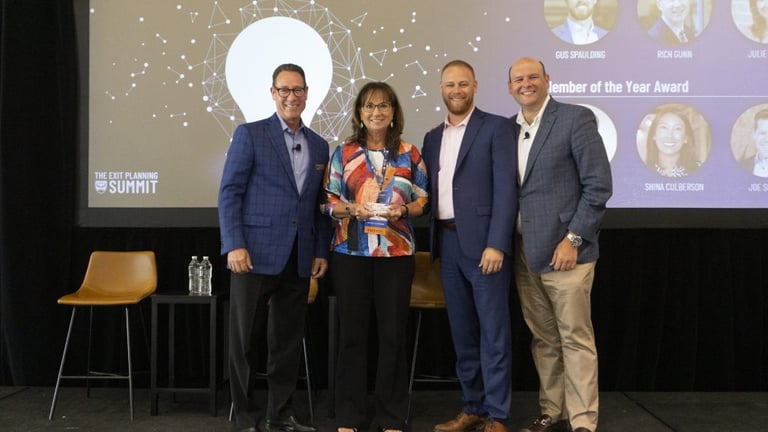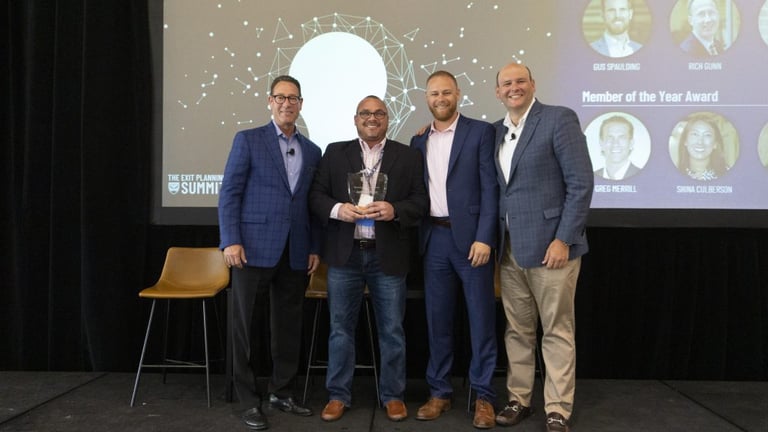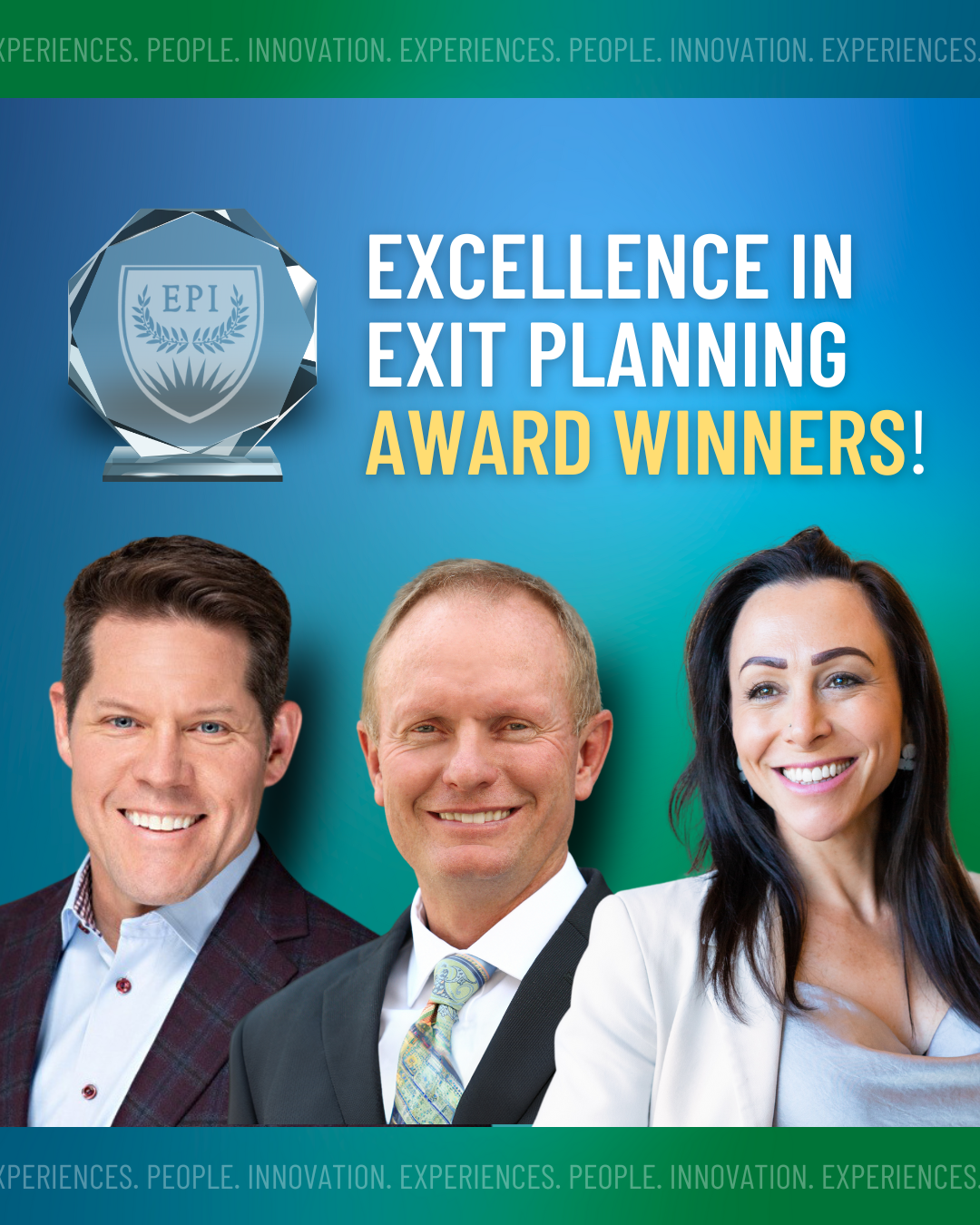
THE EXIT PLANNING BLOG
Keep up-to-date with exit planning, succession planning, industry trends, unique specialty insights, and useful content for professional advisors and business owners.
Share this
An Interview with The 2022 Excellence in Exit Planning Award Winners
by Colleen Kowalski on May 5, 2022

On Tuesday, May 3, 2022, The Exit Planning Institute honored three incredible Certified Exit Planning Advisors (CEPAs) during the tenth annual Excellence in Exit Planning Awards. During the award ceremony in the beautiful ballroom of the JW Marriott Camelback Inn Resort and Spa, Chris Snider, Scott Snider, and James Jack from UBS presented the three awards. We had nine phenomenal nominees for the Member of the Year, Thought Leader of the Year, and Peter Christman Exit Planner of the Year. Join us in congratulating our winners, Shina Culberson, Julie Keyes, and Justin Goodbread!

Chris Snider shared, “Our nominees are role models for us all. They show us what success looks like in the CEPA community. They show us how to effectively use the CEPA. They are leaders because they not only show us, but get us to believe in a worthy cause.”
Learn more about each of these phenomenal CEPAs. We interviewed the winners about their practices, the benefits of being a CEPA, and what this award means to them. Read the interviews below!
Member of the Year: Shina Culberson

The Member of the Year Award is presented to a CEPA who contributes significantly to the EPI community of advisors and the overall exit planning profession. They act as a key leader and expert in their local or regional marketplace and lead exit planning education while driving market awareness.
How does it feel to win an Excellence in Exit Planning Award?
I am grateful just for the recognition. I really enjoy the aspects of teaching and sharing my expertise so it makes me happy that others find value in that. The connection and collaboration with all the EPI members has really fueled what we do today and it is really impactful to be a part of this community.
How has the Rocky Mountain Chapter grown since you became Vice President?
The Advisory Board and I are really happy that we were able to sustain our participation numbers for the Rocky Mountain Chapter through COVID-19. Actually, moving our meetings to a zoom format allowed us to further expand our membership to other areas of the Rocky Mountain area, not just the Denver metro area.
As a member of the CEPA Faculty, what insights are you hoping to share with CEPA candidates during CEPA programs?
I believe as valuation experts, Quist has a unique perspective on the exit planning process. Business valuation is complex, and many advisors can get overwhelmed and intimated by the various valuation techniques and methodologies. However, our goal has always been to make our valuation solutions accessible and easy to understand. At the end of the day, business value comes down to predictability – predictability of cash flows, predictability of high-quality products and services, and predictability that the company can transcend any one individual.
Of your accomplishments from this past year, which are you most proud of?
Our business grew more than 30% last year and we performed hundreds of certified business valuations. We also expanded our team, which was no easy task under these current hiring conditions. Our biggest accomplishment though was defining and refining all of our valuation services and products across a client’s lifecycle from Discovery to Growth and Leaving a Legacy.
How would you define a leader?
I think there are many characteristics that can define a leader. I also believe that our strengths are also our blind spots. Because of this, great leaders surround themselves with great people and through a shared vision, challenge the status quo to achieve great work.
How has your practice changed since you earned your CEPA credential?
Having been both an equity and fixed income securities analyst for most of my career, my area of expertise is in the business assessment and valuation piece of exit planning. What the CEPA credential has provided me, however, is the ability to stretch my comfort zone to address more personal areas of planning. For example, understanding what life after business looks like for a client or integrating personal priorities along with business priorities when selling a business. By taking a more holistic approach with clients, I have been able to generate greater trust.
Also, having access to a robust and collaborative community of like-minded individuals has been immense in helping me close my own knowledge gap. The ability to share challenges and best practices are essential.
What would you suggest to CEPAs looking to be more involved in the CEPA Community?
My number one recommendation is to join an EPI chapter. This brings like-minded people together on a regular basis to share experiences. The EPI Community has certainly grown. I see an increasing need for Implementors and Value Advisors in the CEPA community. As a result, the opportunity to collaborate and build practices together is greater than ever.
Thought Leader of the Year: Julie Keyes

The Leader of the Year Award is presented to a CEPA who has successfully trail blazed a first-of-its-kind project, initiative, or practice which has made a significant contribution to the exit planning profession and the overall community. This advisor is also a thought leader; someone who has taken a position and become a regarded expert/specialist in a specific niche area, a person who tasks, innovates, and influences, and above all, showcases characteristics of collaboration.
How does it feel to win an Excellence in Exit Planning Award?
It was an honor to even be nominated! I know that I’ve made some significant contributions to the industry these past 7 years as a CEPA, which in the end benefits business owners the most and that’s gratifying to know. The owners are the star of our show and winning the Thought Leader of the Year award makes me want to deliver even more as a CEPA. It reminds me of how I feel about Core Values; we embody them but also aspire to be more of what they mean to us.
What about exit planning interests you the most?
I love being an advocate and guide for business owners, so they can achieve their best “Next Act.” I didn’t have the most favorable outcome from my exit many years ago, mostly because my ‘advisors’ lacked the expertise. It could have been a much better, more lucrative experience had I known then what I know now. So, my mission is to coordinate the best outcomes possible for the clients I work with and do whatever I can to perpetuate excellence in exit planning among my peers by speaking, writing, and teaching on the subject.
How has your practice changed since you earned the CEPA credential?
Before I became certified, I did business coaching and consulting work. I started acquiring more clients needing help with exit planning. Once I became certified, I changed my business model, grew a better collaborative team, and re-launched my business. It took a few years of implementing constant business development strategies, but it was worth the effort. I still keep it full throttle when it comes to business development because the opportunities abound and I’m a born industrialist.
How would you define a leader?
One who has earned the trust of many admiring followers through serving his or her industry with courage, generosity, and vision. One who is ethical and dynamic, who champions the success of their followers as much as their own.
What characteristics do you feel make a successful exit planning advisor?
I would say a successful advisor would have the following qualities:
- Empathize with the owner; for most, they have one shot.
- Once the owner believes you have his or her back you’ve become a trusted advisor; trust must be granted over time with a proven track record
- Your words and your actions must match; do what you say you’ll do
- Know your strengths and deliver your best work from your strengths
- Collaborate (even if you’re the only one who knows what’s going on)
- Give good referrals and engage yourself in the introduction; your client and your colleague will both benefit from and appreciate that.
- Adopt a personal best policy of continuous learning and improvement
- Create an action plan, then execute it. Revise quarterly. It’s simple, but not widely practiced.
How has the EPI Community changed since you became a CEPA?
We have a great system for learning and collaborating through the growth of Member Center, Chapter Network, and Events that have grown and evolved since I became a CEPA in 2015. Anyone obtaining their CEPA now is set up for success; EPI has made it a no-brainer for anyone who wants to grow their practice and learn from the best.
You recently published a book and launched a podcast about exit planning called Poised for Exit. What impact has this had on your practice?
The book and podcast have opened many doors for me as a speaker and increased my credibility as a CEPA in other markets. I’ve gained clients in other states because they read my book or listened to my show. These initiatives have greatly impacted my influence with other advisors as well, and my network has grown exponentially since launching them. Having the podcast and authorship platforms allows me to share my authentic style and expand my reach. The business owners and advisors who become followers of mine are attracted because they align with my style and approach. I’m not fit for everybody, but I don’t need to be.
Peter Christman Exit Planner of the Year: Justin Goodbread

Named after the co-founder of EPI, the Peter Christman Exit Planner of the Year Award is the highest honor offered in the exit planning industry. It is awarded to a CEPA who either practices exit planning, manages exit planning engagements, educates business owners and advisors, or provides industry-changing exit planning solutions or tools that can be directly tied to changing outcomes for business owners and leading advisors. This advisor makes significant contributions to the industry and exemplifies the core values and characteristics of EPI and the CEPA credential while making a uniquely significant impact on the larger exit planning profession on a local, regional, national, and/or international scale.
How does it feel to win an Excellence in Exit Planning Award?
I am so humbled. There are so many unbelievably sharp exit planners in the exit planning community, and here I am, just an old country boy who was born and raised on a dirt road down in Georgia. Now, I’ve upgraded to a gravel road in East Tennessee, but I’m still amazed at what can happen when you find your passion.
Being named the Peter Christman Exit Planner of the Year validates that I have found my passion. At the same time, it’s so surreal. So many good things happen to people who aren’t seeking them. I’ve never sought this nomination, but I just want to make an impact on people’s lives. My dad used to tell me, ‘No one outworks a Goodbread. All you’ve got is your name. It’s not a name that will be easily forgotten. So, you better keep your word. You had better represent the name well.’ So, to win this award, means I’m representing well.”
You recently just underwent a business exit yourself. How did your years of experience as a CEPA benefit you in that transition?
Business exits are tough. Over the past 5 or 6 years, I’ve studied this subject immensely. I’ve written books on it. But if I’m being honest, no amount of knowledge can prepare you for the emotional rollercoaster that comes with exiting your business. While you can’t really prepare for the emotional side of it, knowledge can prepare you mentally.
I remember sitting down with my wife, Emily, to determine the number we needed to reach to close our wealth gap. Fast-forward 4 years and we got to see that number become a reality. In fact, we tripled that number. The CEPA program prepared me through process, mindset, and colleagues that I could bring into the fold. I was also able to share that experience with clients, which actually grew in number. Likewise, I was able to do all of this without gutting the team I’ve had the honor and privilege of working with for all these years. None of that would have happened without the CEPA program.
How do you act as a mentor for professional advisors and business owners?
Through this transition, I’m building a financial firm specifically to integrate the CEPA body of knowledge to a national level. I’ve had so much fun doing CEPA work with clients. I’ve gotten to see clients go from broke to closing their wealth gap in the same timeframe that I’ve done so. Getting to be so impactful in their lives and their businesses has been so rewarding.
I used to see people who have reached a certain level in life make videos talking about various courses and programs. I’d see these videos and think, “That makes no sense. Why would someone who’s reached such a level, spend their time trying to educate so many?” Now, I’m not saying I’ve arrived. I’m really not. But now it makes sense. You see, I have the opportunity to build a structure that can impact far more advisors and business owners than I ever could on my own, and in an evergreen format.
I’m only one man. But when you put one person with a team of rockstars, you can achieve excellence. You can change the narrative. By taking my feeble skills and supercharging them with a team of experts, we can make a monumental impact. I can’t wait to see what the next decade is going to yield, and how it will impact so many lives.
Of your accomplishments from this past year, which are you most proud of?
I’m proud of two major accomplishments. First, having my latest book, Your Baby’s Ugly listed as No. 1 on The Wall Street Journal’s Bestselling Books list under Non-Fiction E-Books and No. 56 on USA Today’s Best-Selling Books list was a big deal for me and my team. It was amazing to see all the hard work of so many people be rewarded in such a way.
The second thing I’m most proud of is making the ultimate sale. I built a best-in-class business and it attracted what I believe is a best-in-class buyer. They’re going to take what I’ve built and apply it on a much larger scale. Now, I’m not perfect. I make mistakes. But I try to practice what I preach, and my team knows that. To see the way they rallied around the common mission makes me so proud.
How has your practice changed since you earned the CEPA credential?
The CEPA credential changed my life, not my practice. Before earning the CEPA credential, I was your average financial advisor trying to sell a widget to earn a living. I saw that I could have created real and lasting value in my previous businesses that could have impacted so many people, from team members and their families to vendors.
I remember sitting in the CEPA class and thinking, “Wow! Why doesn’t the world know about this?” I mean, I had read so many books on business and this information just wasn’t being shared. So, when I finished the course, I had this incredible desire to learn all I could about value acceleration and preparing for an exit. I began studying like a mad man and sharing what I learned on the Financially Simple Podcast. As I did that, my life changed. It’s as though I had a purpose for the first time ever, in the business world.
What about exit planning interests you the most?
Exit planning interests me because it’s a vital facet of business that many business owners don’t think about. The reality is that most business owners will never be able to sell their companies. However, I’ve spoken with thousands of business owners, and, for the most part, they all think their business will provide them with the revenue they need to reach their goals.
The sad part of this is that they literally pour their lives into the business, only to be faced with the harsh reality that their efforts are all for naught. Exit planning can change the fate of so many entrepreneurs. That’s why it interests me. It enables me to make a positive impact in the lives of others.
What would you suggest to CEPAs looking to be more involved in the CEPA Community?
First, I’d suggest getting involved with the local chapter in your area. If there isn’t one, take the initiative to start one. There are probably a handful of CEPAs within driving distance of most major cities. So, chances are, you’re going to have at least a few within your region to connect with.
Next, attend the events. We have a summit coming up, but there’s so much more to participate in. There are workshops, training events, and so much more that the EPI is putting together, and you can get so much out of them.
Then, collaborate with as many CEPAs as you can. Even if you’ve been a business owner and gone through the exit planning process on your own, it’s such a complex subject that nobody can possibly know all there is to know. Therefore, there is a great benefit to working with other CEPAs, for yourself and your clientele.
Chris Snider concluded the ceremony by saying, “When you think of the cross-functional talent in this room, there is not one thing we cannot do to change the outcome for business owners.”
Share this
- Blog (520)
- CEPA (367)
- exit planning (243)
- CEPA community (181)
- Business Owner (135)
- Exit Planning Summit (85)
- EPI Chapter Network (82)
- Exit Planning Partner Network (76)
- EPI Announcement (49)
- Content (48)
- Value Acceleration Methodology (46)
- Webinars (37)
- Excellence in Exit Planning Awards (32)
- Marketing (30)
- 2024 Exit Planning Summit (28)
- 5 Stages of Value Maturity (26)
- Books (24)
- Exit Planning Teams (22)
- EPI Team (21)
- 2023 Exit Planning Summit (20)
- Leadership (20)
- family business (19)
- women in business (19)
- Intangible Capital (18)
- Exit Options (17)
- Black Friday (16)
- EPI Academy (16)
- CPA (15)
- State of Owner Readiness (14)
- Chapters (12)
- Chris Snider (12)
- National Accounts (12)
- Small business (12)
- Walking to Destiny (12)
- charitable intent (12)
- personal planning (12)
- Financial Advisors (9)
- 5 Ds (8)
- About us (8)
- Podcast (8)
- Insiders Bash (7)
- Scott Snider (7)
- Christmas (6)
- Exit Planning Content Library (6)
- Case Studies (5)
- Owner Roundtables (5)
- Season of Deals (5)
- Value Advisors (5)
- financial planning (5)
- Awards (4)
- Exit & Succession (4)
- Five Ds (4)
- executive training (4)
- Circle of Excellence (3)
- Owners Forum (3)
- forbes (3)
- EPI Thought Leadership Council (2)
- Exit Is Now Podcast (2)
- Peter Christman (2)
- Three Legs of the Stool (2)
- Veteran (2)
- Whitepapers (2)
- author (2)
- Business Owners Forum (1)
- DriveValue (1)
- business consultants (1)






